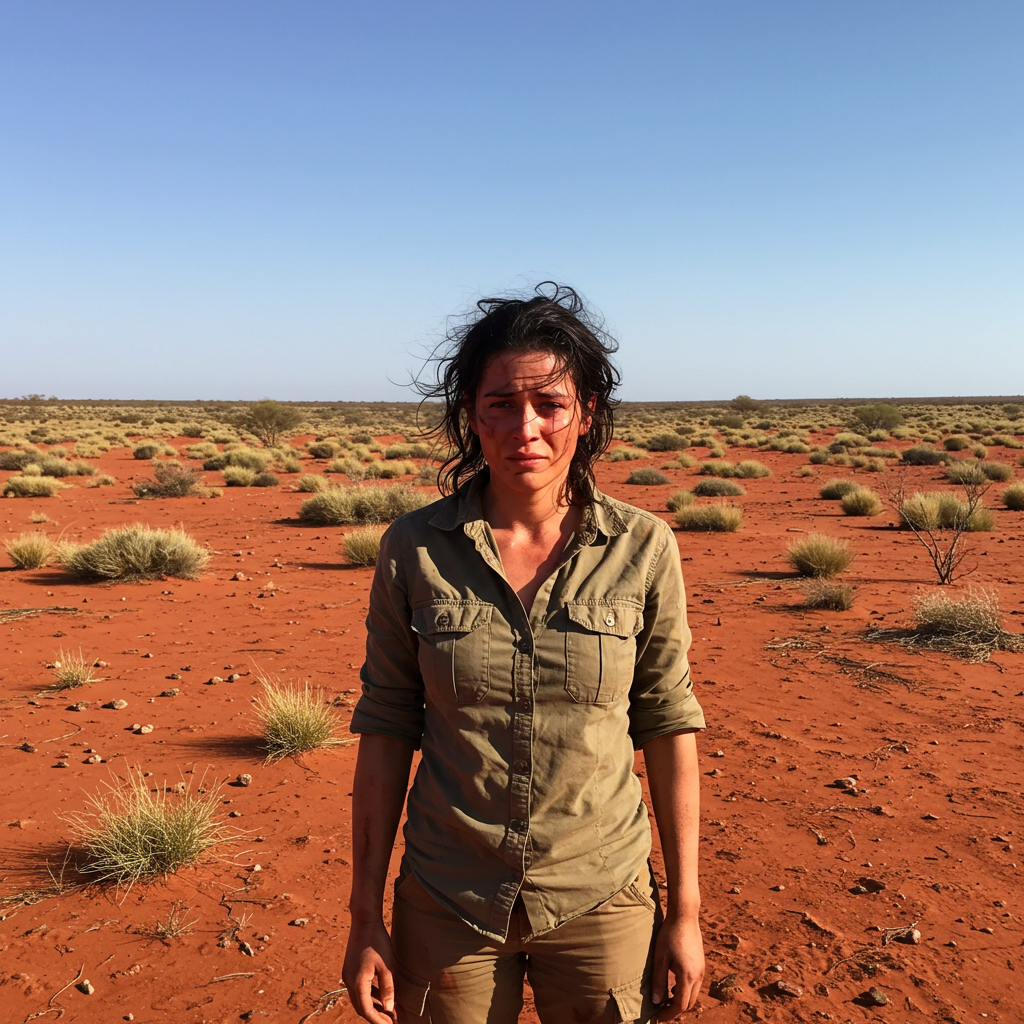In a story described as nothing short of miraculous, a 26-year-old German backpacker, Carolina Wilga, has been found alive after being missing for 12 harrowing days in the vast, remote Outback of Western Australia. Her disappearance triggered an extensive search operation that captivated attention globally. Wilga was located on Friday, July 11, 2025, bringing immense relief to her family, friends, and the dedicated search teams. Her survival in the notoriously harsh Australian wilderness is being hailed as a remarkable feat of endurance.
Found Against All Odds
The dramatic rescue unfolded late Friday evening when a member of the public spotted Carolina Wilga. She was found walking along a forest track near the edge of the sprawling Karroun Hill Nature Reserve. This discovery came just a day after her abandoned van was located deep within the bushland, significantly narrowing the search zone.
Western Australia Police Force Inspector Martin Glynn shared the good news. He reported Wilga was in a “fragile” state when found. She had sustained injuries, particularly suffering severely from mosquitoes. Despite the ordeal, initial assessments indicated no serious life-threatening conditions. Following her discovery, officials quickly arranged for her to be airlifted to Perth. She was transported to a hospital there for urgent medical attention and evaluation.
The Search for a Missing Backpacker
Carolina Wilga was last seen on June 29, 2025. Her last known sighting was at a general store in the small wheat farming town of Beacon. This remote community is located approximately 200 miles northeast of Western Australia’s capital city, Perth. Family and friends also last heard from her on that same day.
As the days passed with no contact, concerns for her safety grew. A widespread search effort was eventually launched by Western Australia police. The search area was vast and incredibly challenging. It focused on the remote bushland north of Beacon, a region known for its difficult terrain and isolated nature.
The Clue: An Abandoned Van
A significant breakthrough in the search occurred on Thursday, July 10. A police helicopter crew conducting an aerial sweep spotted a vehicle in the wilderness. It was confirmed to be Carolina Wilga’s van. The vehicle, a 1995 Mitsubishi Delica Star Wagon, was found stuck in mud and bushes. It was located within the rugged expanse of the Karroun Hill Nature Reserve.
Police estimate the van was approximately 22 miles north of Beacon. It was situated about 35 kilometres away from any main tracks. This isolation highlighted the difficulty faced by search teams. Inspector Glynn described the area as “very difficult country” and called the aerial sighting of the vehicle in such a large area a “miracle.”
Evidence at the scene indicated attempts had been made to free the vehicle. Recovery boards, also known as Maxtrax, and pieces of wood were found under the rear wheels. The van itself was equipped with solar panels and reserves of drinking water. However, despite these resources and her efforts, Wilga was apparently unable to free the bogged vehicle.
Police Theory: Stuck, Then Lost
Based on the evidence found at the van, police developed a theory about what happened. They believe Wilga’s van became stuck in mud on June 29, the day she was last seen. After failing to free the vehicle, they suspect she made the difficult decision to leave it and proceed on foot.
Acting Inspector Jessica Securo noted that the terrain included large rocky outcrops. She emphasized that an inexperienced person could easily become lost or disorientated there. The remote location of the van, far from main roads, supported this assessment. Police stated that there was no indication of foul play involved in her disappearance. They concluded that Wilga likely became lost after walking away from her immobilized vehicle.
Surviving the Hostile Environment
The 12 days Carolina Wilga spent missing were endured in an incredibly challenging environment. The Karroun Hill Nature Reserve is vast, covering more than 740,000 acres (over 300,000 hectares). The region is known for its “very hostile environment,” as described by Inspector Glynn. This hostility comes from both the “flora and fauna.”
Conditions during the search period were also difficult. Overnight temperatures dropped significantly, nearing or even reaching zero degrees Celsius (around 32-36.7 Fahrenheit). There was no rain recorded in the immediate area during this time. Adding to the discomfort and challenges were the severe effects of mosquitoes, which heavily impacted Wilga.
Police officials praised Wilga’s resilience and survival skills. Inspector Glynn stated she had clearly “coped in some amazing conditions.” He called her survival a “testimony to her bravery” for enduring such a difficult situation. While the exact distance she travelled from her van remains unknown, she must have covered a considerable area in her desperate search for help. The ordeal she experienced was undoubtedly “a thousand times worse” than the challenges faced by the search teams themselves.
Who is Carolina Wilga?
Carolina Wilga is a 26-year-old German national. She had been backpacking around Australia for the past two years. During her time in Western Australia, she had reportedly worked at mine sites in regional areas. Her mother, Katja Wil, located in Germany, had made a public appeal for help in finding her daughter, highlighting the family’s deep concern during her disappearance.
Relief and the Road Ahead
The news of Carolina Wilga being found alive was met with immense relief across Western Australia and internationally. Inspector Glynn called her safe return a “great result” for her family and everyone involved in the extensive search effort. He highlighted the dedication of the police, emergency services, and members of the public who provided information and assisted in the search.
Western Australia Premier Roger Cook also commented on the positive outcome via social media. He described her rescue as “nothing short of remarkable.” Premier Cook extended his thanks to all involved in the search and rescue operation.
While Wilga is now safe and receiving medical care in Perth, the full details of her 12-day ordeal are yet to be fully known. Inspector Glynn anticipates that once she is able to share her account, it will be a “remarkable story” detailing her experiences and survival in the remote Outback. Her recovery is now the primary focus.
Frequently Asked Questions
What led to Carolina Wilga going missing in the Outback?
Police believe Carolina Wilga went missing after her van, a 1995 Mitsubishi Delica Star Wagon, became stuck in mud in a remote area of the Karroun Hill Nature Reserve. This likely occurred on June 29, the day she was last seen. Evidence suggested she attempted to free the vehicle but was unsuccessful. She then appears to have left the van on foot and subsequently became lost in the vast and difficult terrain. Police have ruled out any indication of foul play.
Where was Carolina Wilga’s van found, and how remote was the location?
Carolina Wilga’s abandoned van was discovered by a police helicopter crew within the Karroun Hill Nature Reserve in Western Australia. This location is approximately 22 miles north of the town of Beacon and roughly 150km from the town. It was situated about 35 kilometres away from any main tracks. The area is described as very remote, vast, and characterized by challenging bushland and rocky outcrops, making travel and navigation extremely difficult.
What were the conditions Carolina Wilga faced during her 12 days missing in the Outback, and how was she found?
During her 12 days missing in the remote Western Australian Outback, Carolina Wilga faced extremely harsh conditions. The environment is hostile, with challenging flora and fauna. She endured cold overnight temperatures that dropped near zero degrees Celsius. She was also severely affected by mosquitoes. Wilga was found alive on Friday, July 11, 2025, walking on a forest track near the edge of the nature reserve by a member of the public.
A Story of Survival and Resilience
Carolina Wilga’s safe return from the remote Australian Outback is a powerful testament to human resilience and the effectiveness of coordinated search efforts combined with fortunate circumstances. Her 12-day ordeal highlights the inherent dangers of exploring vast wilderness areas. However, it also underscores the incredible will to survive in the face of overwhelming challenges. As she recovers, the world awaits the full story of her remarkable journey.
Word Count Check: 1115



